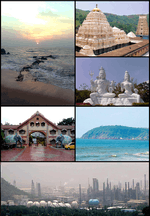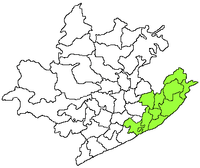Indira Gandhi Zoological Park
Indira Gandhi Zoological Park is located amidst Kambalakonda Reserve Forest in Visakhapatnam, Andhra Pradesh, India. It is the third largest zoo in the country.[2][3]
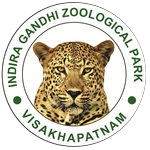 | |
| Date opened | 1977 |
|---|---|
| Location | Visakhapatnam, Andhra Pradesh, India |
| Coordinates | 17.7691°N 83.3500°E |
| Land area | 625 acres (253 ha) |
| No. of animals | 850 |
| No. of species | 75 |
| Annual visitors | 10 million |
| Memberships | CZA[1] |
| Website | vizagzoo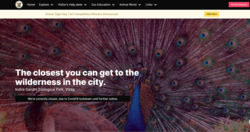 |
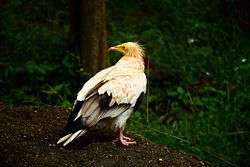
_at_IG_Zoological_park_in_Visakhapatnam_01.jpg)
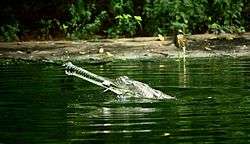
The zoological park is named after the former Prime Minister of India, Indira Gandhi. It was declared open to the public on 19 May 1977.[4] It covers an area of 625 acres (253 ha). It is situated in Visakhapatnam amidst the scenic Eastern Ghats of India. It is surrounded by the Eastern Ghats on three sides and Bay of Bengal on the fourth side. Nearly eighty species of animals numbering to about eight hundred are present in the zoo. The Zoo Park has different sections for primates, carnivores, lesser carnivores, small mammals, reptiles, ungulates and birds caged in their natural ambiance.
In collaboration with Stardust Ventures, Vizag zoo launched a web portal for animal adoption, to engage the community with latest events. It also allows general public to adopt an animal for certain time period. IGZP conducts various events regularly, like E-Webinars and Quizes and also provides E-Certificates for the participants. The webinars are interactive sessions organized with various experts, and are streamed live over youtube.
The zoo park is about 11 kilometres (6.8 mi) from the Visakhapatnam railway station on the National Highway 5 near Madhurawada. It has entrance and exit gates situated oppositely, with one towards National Highway 5 and the other towards Beach Road at Sagar Nagar. It is open to public daily except Monday.
Unique features & special attractions
625 acres (253 ha) land area with abundant flora & fauna. Nearly 80 species of mammals, birds, and reptiles are present in the zoo (more than 800 animals).
Battery vehicles facility to visit zoo.
Natural reserve forest atmosphere.
Open reptile (especially snakes) "serpentarium". Entire zoo park is provided with free wifi facility.
Special breeding programmes like Indian wild dog (dhole), white tigers. Free living animals like spotted deers, wild boars and birds etc.
Best interactive & impressive, innovative knowledgeable educational activities.
Pollution free environment, best picnic spot & tourist place.
An excellent interpretation & wild life learning center and a Library are present inside the zoo park near the canteen (Bioscope) with touch table & specimens which is very useful to understand about significance of nature & to improve wild life knowledge.
Various educational awareness activities & programmes specially conducted for children, students.
Exhibits
In an area of 625 acres (253 ha) the zoological park located among the Kambalakonda Wildlife Sanctuary of Eastern Ghats, the zoo has enclosures for primates, carnivores, lesser carnivores, small mammals, reptiles, ungulates and birds aviaries with a well-planned layout map, a jungle along a water body inside the zoo park. The animal exhibits in the zoo park are as follows:
Birds
Endemic: Pelican (rosy and gray), Painted stork, Peafowl, Duck, Spotted dove, Lovebird, Parakeet, Eagle, Vulture.
Exotic: Budgerigar, Macaw, Ostrich, Emu.
Primates
Endemic: Bonnet monkey (common Indian monkey), Rhesus monkey.
Exotic: Olive baboon, Mandrill, Ring-tailed lemur (lemur catta), Goeldi's marmoset. Most Recent inclusion is the new primate species i.e.., three Chimpanzees which were brought from Tisch Zoo in Jerusalem under an agreement done by the Government of India with Israel's Nature Parks Authority.
Herbivores
Endemic: Barking deer, Elephant, Wild boar, Gaur, Sambar deer, Spotted deer, Nilgai, Swamp deer, Eld's deer (thamin deer), Indian rhinoceros.
Exotic: Hippopotamus and Giraffe.
Lesser carnivores
Endemic: Jackal, Wild dog, Striped hyena, Rusty-spotted cat, Dhole, and Jungle cat.
Bears
Endemic: Sloth bear, Himalayan black bear.
Reptiles
Endemic: Python, Cobra, King cobra, Rat snake, Indian star tortoise, Tortoise, Terrapin, Water monitor lizard, Monitor lizard, Green iguana, Mugger crocodile and Gharial.
Along with this, Butterfly park and Nocturnal Animal House which has Owls, Porcupines, and Civets are special attraction.
Gallery
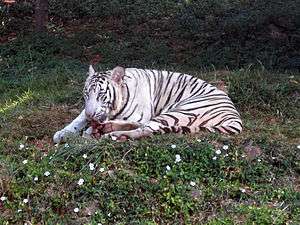 White tiger
White tiger- Sloth bear (Melursus ursinus)
- Wild boar (Sus scrofa)
- Gaur or wild bison
- Bonnet macaque (Macaca radiata)
- Indian crested porcupine (Hystrix indica)

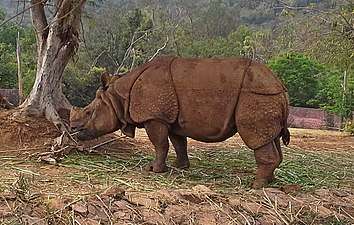
- Meenalokam at Zoo Park
 Mandrill
Mandrill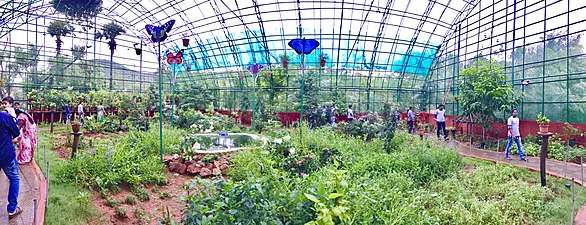 Inside Butterfly world in Indira Gandhi Zoological park
Inside Butterfly world in Indira Gandhi Zoological park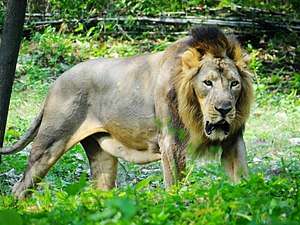 Lion
Lion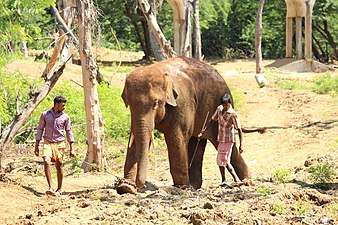 Elephant
Elephant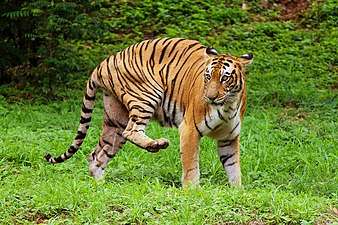 Tiger
Tiger
References
- "Search Establishment". cza.nic.in. CZA. Retrieved 4 July 2011.
- VR, Rohith (25 March 2016). "Top 10 Most Popular Zoos in India 2016".
- http://www.top10gallery.com/2012/02/top-10-largest-zoos-in-india-best-zoos.html
- "APForest dept". Archived from the original on 11 July 2007. Retrieved 4 May 2007.
External links

- Official website of: "Central Zoo Authority of India" (CZA), Government of India
- Vizag Zoo
